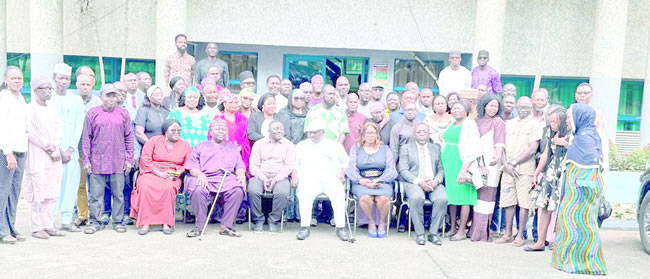The global workforce is rapidly evolving, with technology as its main driver and digital skills as its lifeline. According to the International Labour Organisation (ILO), digital literacy has become essential for succeeding in today’s job market, as the world faces a dual challenge: modernising economies and fostering environmental sustainability. With digital skills now a necessity for business efficiency and sustainability, countries must invest in equipping their workforce to thrive in a digital-first economy. This vision aligns with broader UN goals, like sustainable economic growth and decent work for all, as outlined in the Sustainable Development Goals (SDGs). This focus on the future of work is precisely what the Digital Bridge Institute (DBI) recently impacted employees across Nigeria’s tertiary institutions and trade unions. CHRISTIAN APPOLOS explores why DBI’s role is indispensable in Nigeria’s digital shift.
In Nigeria, digital skills hold the potential to transform labour markets, create green jobs, and pave the way for a just transition to a sustainable economy. By empowering workers with digital proficiency, Nigeria can unlock new economic opportunities, reduce dependency on extractive industries, and foster resilience in the face of technological disruptions. Bridging the digital skills gap across economic sectors has become crucial for ensuring both efficiency and economic progress. The Digital Bridge Institute of the Nigerian Communications Commission (NCC), has positioned itself as a driving force in delivering critical digital education to Nigeria’s workforce, supporting the country’s transition to a digitalised and prosperous future.
The role of digital skills in Nigeria’s emerging economic landscape
Digital skills are no longer optional in today’s labour market, in fact, they are the most essential. A lack of digital skills can create significant obstacles for workers, limiting their career advancement and reducing productivity across sectors. For Nigeria, fostering a digitally literate workforce is essential not only for economic competitiveness but also for building an inclusive and resilient economy that can adapt to the changing demands of the global market.
Digital skills are also critical in supporting the development of green jobs and promoting a just transition to sustainable practices. Green jobs, defined as roles that contribute to preserving or restoring the environment, require proficiency in digital technologies to drive efficient resource management, reduce emissions, and improve sustainability practices. In Nigeria, the need to diversify away from oil dependence and integrate more sustainable economic activities places digital skills at the center of the country’s growth strategy. For instance, digital technologies enable smart agriculture, renewable energy management, and efficient waste management systems, all of which support a greener economy. As Nigeria hopes to embark on this path, digital skills are obviously the backbone of a transition that promises to be both economically viable and environmentally responsible.
In line with these objectives, Nigeria’s public and private sectors must prioritise digital skill acquisition to enhance productivity and efficiency. For sectors such as healthcare, education, finance, and trade, digital proficiency can streamline operations, reduce costs, and facilitate effective service delivery. The Nigerian government’s commitment to digitalization, reflected in policies and initiatives driven by the Ministry of Communications, Innovation, and Digital Economy, is a testament to the transformative potential of a digitally enabled workforce. Equipping workers with these essential skills will lead to an empowered labor force, capable of delivering consistent and improved service outcomes across the board.
Digital Bridge Institute: Pioneering digital skills for Nigeria’s teeming workforce
The Digital Bridge Institute (DBI), an agency under the Nigerian Communications Commission (NCC), is a leading institution for digital education in Nigeria. Recognising the urgency of digital transformation, DBI has undertaken a mission to equip Nigeria’s workforce with the skills needed to succeed in the digital economy. Established as a Centre of Excellence in Information and Communications Technology (ICT) training, DBI offers a wide array of courses designed to meet the technical, managerial, and commercial needs of modern businesses.
Led by President and CEO David Daser, DBI has established campuses in major Nigerian cities including Abuja, Lagos, and Kano, with additional campuses planned for Yola, Asaba, and Enugu. Daser emphasizes that DBI’s training programs are aligned with international best practices, making them highly relevant in today’s competitive job market. “Our courses provide sufficient academic and professional preparation, whether your desire is to be an entrepreneur or to be part of an organisational team,” Daser stated, highlighting DBI’s role in cultivating both business and technical skills.
Since 2004, DBI has trained over 60,000 professionals across various sectors, including both private and public organizations. The institute’s modern facilities, which include multimedia-equipped classrooms, telecom laboratories, video conferencing systems, and a digital resource library, enable an immersive learning environment. Beyond skill development, DBI is committed to fostering indigenous software development, conducting research on cybersecurity, and advancing electronic multimedia technologies. With these initiatives, DBI is helping to create a workforce that is not only digitally skilled but also innovative and resilient in the face of technological advancements.
DBI’s comprehensive approach to digital skills training was exemplified by a recent course titled “Digital Skills, Cybersecurity, and Emerging Technologies” (DiSCET). This training, delivered to workers in Nigeria’s tertiary institutions and trade unions, addressed some of the most pressing challenges in digital literacy, cybersecurity, and emerging technologies. Through this program, DBI has reached workers across Nigeria’s six geopolitical zones, delivering essential training to universities, polytechnics, and trade unions.
One particularly impactful initiative is the Advanced Digital Empowerment Programme for Tertiary Institutions (ADEPTI), funded by the NCC and implemented through DBI. This program has successfully brought digital education to institutions nationwide, from universities to polytechnics and colleges of education. ADEPTI has made it possible for hundreds of workers, including 100 members of the Judiciary Staff Union of Nigeria (JUSUN), to benefit from advanced ICT training.
Notable institutions that benefited in the South West, are the University of Ibadan and Federal College of Forestry Ibadan, University of Ilesa, Ekiti State University, Federal University of Technology Akure, Federal College of Education Iwo, M O K Abiola Polytechnics Abeokuta. In the North West: Police Academy Wudu, Kano State, North-West University Sokoto, Nigerian Institute of Leather and Science Technology Zaria, Kaduna State. North East: Federal College of Education Gombe, Taraba State University, Jalingo, Adamawa State University Mubi, Federal Polytechnics Bali Taraba State, Gombe State College of Education Billiri. South-South: Edo State College of Education Agudu. Benson Idahosa University Benin City, Well Spring University Benin City, Admiralty University (Nigerian Navy University) Ibusa, Federal Polytechnics for Oil and Gas Bonin Island, Rivers State, Federal Polytechnics Orogun Delta State. South East: Anambra State Polytechnics, Mgbakwu, Kingsley Ozumba Mbadiwe University Ideato, Imo State, Tansian University Umunya, Federal Polytechnics Nekede, Owerri. North Central: Veritas University Bwari, Abuja, Phoenix University Agwada, Kogi State, Federal Polytechnics Offa, Kwara State and Judiciary Staff Union of Nigeria (JUSUN).
JUSUN members received intensive training in response to the federal government’s judiciary digitisation policy, equipping them with future-proof skills to enhance job security and productivity. “The world is going digital,” JUSUN President Comrade Marwan Mustapha Adamu remarked, urging organizations across Nigeria to leverage DBI’s expertise for workforce training. Adamu’s call for government agencies, private organizations, and other unions to embrace DBI’s programs underscores the importance of digital skills in adapting to and thriving in the global digital economy.
DBI: A national strategy for digital empowerment
As Nigeria seeks to empower its workforce with digital skills, DBI’s role is becoming increasingly pivotal. The institute’s outreach, from training students and faculty in tertiary institutions to equipping judiciary staff, reflects a national commitment to embedding digital literacy across all sectors. This national strategy aligns closely with the government’s broader digitalization agenda under the leadership of President Bola Tinubu, with a particular focus on empowering Nigeria’s youth. The Ministry of Communications, Innovation, and Digital Economy has launched the 3MTT initiative, aiming to develop skilled youth who are ready to take on the demands of the global digital economy.
To ensure that Nigeria remains competitive, initiatives like DBI’s digital skills training must continue to expand, bringing access to even more institutions and regions. This will require not only increased government funding but also greater collaboration between public and private sectors. As Nigerian businesses and institutions evolve, digital proficiency will be a key determinant of success. By creating a digitally skilled workforce, Nigeria is laying the foundation for economic diversification, resilience, and growth.
Building a resilient digital economy
Digital skills are no longer an added advantage, they are the foundation for economic survival and growth. For Nigeria, where economic transformation is both a necessity and an opportunity, digital proficiency is essential. With institutions like DBI at the helm, Nigeria is well-positioned to build a skilled workforce that can drive the country’s transition into a diversified, sustainable, and digitally enabled economy.
Looking at countries like China and India, it’s clear how pivotal digital skills have been in their economic ascension. In China, the government’s relentless focus on technology education and digital upskilling has helped transform the country into the world’s manufacturing and tech powerhouse. China’s digital economy powered by its highly skilled workforce now accounts for nearly 40% of its GDP. This growth has been supported by massive investment in tech education and initiatives that bring digital skills training to both urban and rural areas. The country has also fostered a digital ecosystem that promotes entrepreneurship and innovation, giving rise to some of the world’s largest tech companies.
India provides another strong example. Through targeted digital initiatives like “Digital India,” which focuses on extending digital literacy and building internet infrastructure, India has dramatically enhanced the skills and productivity of its workforce. India’s IT sector has flourished, creating millions of jobs, while its digital services and outsourcing industries now serve clients worldwide. By creating a pipeline of digitally proficient professionals, India has not only improved employment opportunities but also elevated its global economic standing, making it a preferred hub for tech innovation and services.
These examples from China, India, and other emerging economies demonstrate the power of digital skills in driving national prosperity and global competitiveness. The scalability of digital skills programs in these nations has brought both urban and rural communities into the economic fold, transforming them into active participants in the digital economy. This inclusive approach ensures that digital transformation benefits all segments of society, not just a select few.
Nigeria, with its abundant youth population and rapid urbanization, has a similar opportunity. By scaling up digital skills training across sectors and regions, Nigeria can unlock new economic potential, foster innovation, and achieve sustainable growth. The DBI’s initiatives, along with government support, can empower Nigerian workers to not only adapt to the demands of the digital age but also to drive Nigeria’s economic transformation. Upskilling Nigeria’s workforce with digital competencies will build resilience in the country’s labor market, reduce reliance on traditional sectors, and promote the emergence of a knowledge-based economy.
As Nigerian businesses and institutions evolve, digital proficiency will be a key determinant of success. By creating a digitally skilled workforce, Nigeria is laying the foundation for economic diversification, resilience, and growth. The message from DBI and stakeholders like JUSUN is clear: Nigeria cannot afford to lag in the digital race. Embracing digital literacy will shape the future of work, drive economic resilience, and enable Nigeria to realize its vision of a prosperous and sustainable future.
READ ALSO: JUST IN: Tinubu directs release of minors arraigned for #EndBadGovernance protests







